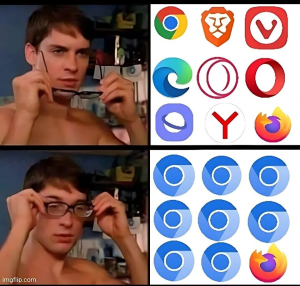Chromium
The Chromium Empire: A Web of Woe?
The internet, once a vast frontier, now resembles a walled garden. At the center stands Chromium, the open-source browser engine that powers Google Chrome and a frightening number of its rivals. But beneath the veneer of open collaboration lurks a potential dark lord: Google itself.
V8: A Speed Demon with a Bloated Carriage
At the heart of Chromium lies the V8 engine, Google's champion of blazing-fast browsing. While its performance is undeniable, it comes at a cost. Chromium, burdened by its feature-laden core, is notorious for being a RAM hog. Every browser based on it inherits this insatiable hunger, leaving users with sluggish devices and a nagging question: is all this speed worth the bloat?
The Dark Prefix
Remember "-webkit-," those strange prefixes that littered CSS code a while back? A Google invention, they were meant to push the boundaries of web design. But there was a catch – they only worked on WebKit browsers, a Google-led project. While these prefixes eventually became standardized as CSS3, this episode highlighted Google's willingness to prioritize its own agenda over open web standards.
Web of Woes: The WebP Fiasco
WebP, Google's image format darling, promised smaller file sizes and faster loading times. But in its haste to crown a new champion, Google overlooked a crucial detail: compatibility. Many older browsers and devices choked on WebP, leaving users staring at broken images. This push for a non-universal format, designed to benefit Google's infrastructure more than the user experience, further solidified Google's image as the web's self-proclaimed ruler.
The Typing Whisperer: A Privacy Nightmare?
And then there's the unsettling matter of typing suggestions. As you type in the address bar, Chromium whispers your queries to Google, ostensibly to offer helpful suggestions. But this constant data stream raises a troubling question: what else is Google learning from these whispers? Is it simply autocompletion, or a subtle method of harvesting your search intent?
The Perils of a Monopoly
The lack of true competition in the browser space allows Google to exert significant control. While Chromium's open-source nature might seem democratic, Google's influence over its development gives them the power to shape the web in their image. This lack of competition creates a situation where Google can introduce features that prioritize their own interests, sometimes at the expense of user experience and open standards.
Website Woes: The Ad Blocker Blockade
Let's not forget the financial side of things. A significant portion of Google's revenue comes from website advertisements. The rise of ad blockers has put a dent in those profits, and Google is constantly working to make them less effective. This constant game of cat and mouse can lead to a frustrating experience for users who just want a clean, ad-free browsing experience.
The Gecko Rises Again?
Trivia: Remember Firefox? While Chrome took center stage, Firefox, powered by the Gecko engine, has quietly been catching up. They've made significant strides in performance while staying true to open web standards and prioritizing user privacy.
The Choice is Yours
In the end, you, the user, hold the power. By understanding the potential downsides of Chromium and exploring alternative browsers like Firefox, you can ensure a web browsing experience that prioritizes both speed and privacy. Don't be a pawn in the browser wars; take control of your web experience. The future of the web might just depend on it.
